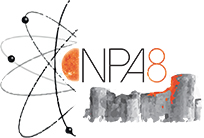Speaker
Dr
Christoph Langer
(University of Frankfurt a. M.)
Description
Charged-particle reactions, like (p, g) or (a, g), play a crucial role in many different astrophysical scenarios, such as the p process.
Their direct measurement is key for nucleosynthesis model predictions, but is typically hampered by very low cross sections and the lack
of intense radioactive ion beams.
In this contribution, a novel, powerful method will be presented, which aims at overcoming these limitations: we used decelerated cooled beams in the ESR storage ring at GSI to measure the 124Xe(p, g) reaction directly in inverse kinematics.
This reaction belongs to the p process flow and serves as a perfect benchmark for this method.
The stable 124Xe beam was accelerated in the UNILAC and the SIS18 to high energies of about 100 AMeV, fully stripped and injected into the ESR.
The beam was subsequently decelerated and then cooled with the electron cooler: we were thus able to push the beam energy down to the Gamow window while maintaining brilliant energy resolution.
For the first time, this enabled a reaction measurement at the astrophysically relevant energies.
In the future, this method will allow reaction studies using radioactive ion beams in or close to the Gamow window at low beam intensities and low cross sections.
This contribution will describe the technique and first results will be presented. Also, an outlook towards future studies and techniques will be given.
Primary authors
Dr
Christoph Langer
(University of Frankfurt a. M.)
Jan Glorius
(GSI Darmstadt)
Zuzanna Slavkovska
(Goethe University Frankfurt)
Co-authors
Alexandre Gumberidze
(GSI)
Bastian Löher
(GSI)
Beatriz Jurado
(CENBG)
Benedikt Thomas
(Goethe University Frankfurt)
Benjamin Brückner
(Goethe University Frankfurt)
Carsten Brandau
(JLU Giessen)
Christian Trageser
(GSI)
Christophor Kozhuharov
(GSI)
Claudia Lederer-Woods
(Edinburgh University)
Mr
Clemens Wolf
(Goethe University Frankfurt)
Deniz Kurtulgil
(Goethe University Frankfurt)
Fritz Nolden
(GSI)
Gregory Lane
(ANU)
György Gyurky
(ATOMKI)
Haik Simon
(GSI)
Hans Törnqvist
(GSI)
Hillenbrand Pierre Michel
(GSI)
Kathrin Göbel
(Goethe University Frankfurt)
Mario Weigand
(Goethe University Frankfurt)
Markus Steck
(GSI)
Matthew Reed
(ANU)
Michael Heil
(GSI)
Michael Lestinsky
(GSI)
Nikos Petridis
(GSI)
Ole Hinrichs
(Goethe University Frankfurt)
Philipp Erbacher
(Goethe University Frankfurt)
Regina Hess
(GSI)
Prof.
Rene Reifarth
(Goethe University Frankfurt)
Sergey Litvinov
(GSI)
Sergey Torilov
(Saint Petersburg)
Sergiy Trotsenko
(Helmholtz Institute Jena)
Shahab Sanjari
(GSI)
Mr
Stefan Fiebiger
(Goethe University Frankfurt)
Tamás Szücs
(ATOMKI)
Prof.
Thomas Stoehlker
(GSI-Darmstadt)
Tobias Gassner
(GSI)
Tom Davinson
(Edinburgh University)
Ulrich Popp
(GSI)
Uwe Spillmann
(GSI)
Volknandt Meiko
(Goethe University Frankfurt)
Dr
Yuri Litvinov
(GSI Helmholtzzentrum für Schwerionenforschung)
Prof.
philip woods
(edinburgh university)

